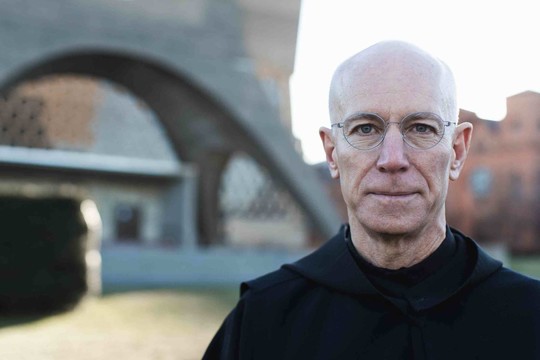
Join UCLA scholars and students for a live streaming of the 2019 National Endowment for the Humanities Jefferson Lecture in the Humanities, given by this year’s recipient of the honor, Father Columba Stewart, executive director of the Hill Museum & Manuscript Library (HMML) at Saint John’s University in Collegeville, Minnesota.
October 7 @ 4:30 pm – 6:30 pm
YRL Scholarly Innovation Lab, Charles E Young Research Library 280 E Charles Young Drive
“A ‘Monument Man’ of our time, Father Columba Stewart has dauntlessly rescued centuries’ worth of irreplaceable cultural heritage under threat from around the world,” said NEH Chairman Jon Parrish Peede. “In doing so, he and his colleagues have helped preserve the records of the religion, art, literature, culture, and knowledge of distant eras of human history so that we may celebrate and learn from those that came before us.”
Stating that he was “deeply humbled” by his selection, Stewart replied, “It is an extraordinary moment in our nation’s intellectual life, and one in which a keener sense of the wisdom and experience of the past, critically interpreted, has much to offer.”
Dubbed “the monk who saves manuscripts from ISIS,” by Atlantic magazine, Stewart has spent 15 years working with international religious leaders, government authorities, and archivists to photograph and digitize ancient to early-modern religious manuscripts, especially those at risk due to war, strife, or economic uncertainty.
Stewart has traveled to the Middle East, Africa, Eastern Europe, the Caucasus, and South Asia to partner with local communities to photograph historic handwritten books and documents in their original context. His work has taken him to some of the world’s most volatile regions, including Syria, Iraq, and the Balkans, to safeguard centuries-old sacred documents from a variety of religious traditions as well as nonreligious texts that record vital aspects of history and culture. In 2013, Stewart forged a partnership in Mali to digitize more than 250,000 ancient Islamic manuscripts and books rescued from Timbuktu.
Since becoming executive director of HMML in 2003, Stewart has striven to make these documents available to a wide public, aided in part by grants from the National Endowment for the Humanities. In 2015 HMML launched an online reading room to give visitors access to the library’s growing digitized collection of more than 250,000 handwritten books and 50 million handwritten pages, the world’s largest digital collection of ancient manuscripts.
A scholar of early Christian monasticism, Stewart holds a bachelor’s degree in history and literature from Harvard University, a master’s in religious studies from Yale University, and a D.Phil. in theology from Oxford University. Stewart has published extensively on ancient Christianity, monasticism, and manuscript culture, including Working the Earth of the Heart: the Messalian Controversy in History, Texts and Language to 431 (Oxford: Clarendon Press, 1991), Cassian the Monk (Oxford University Press, 1998), Prayer and Community: the Benedictine Tradition (Orbis Books, 1998), and a wide range of essays and articles.

